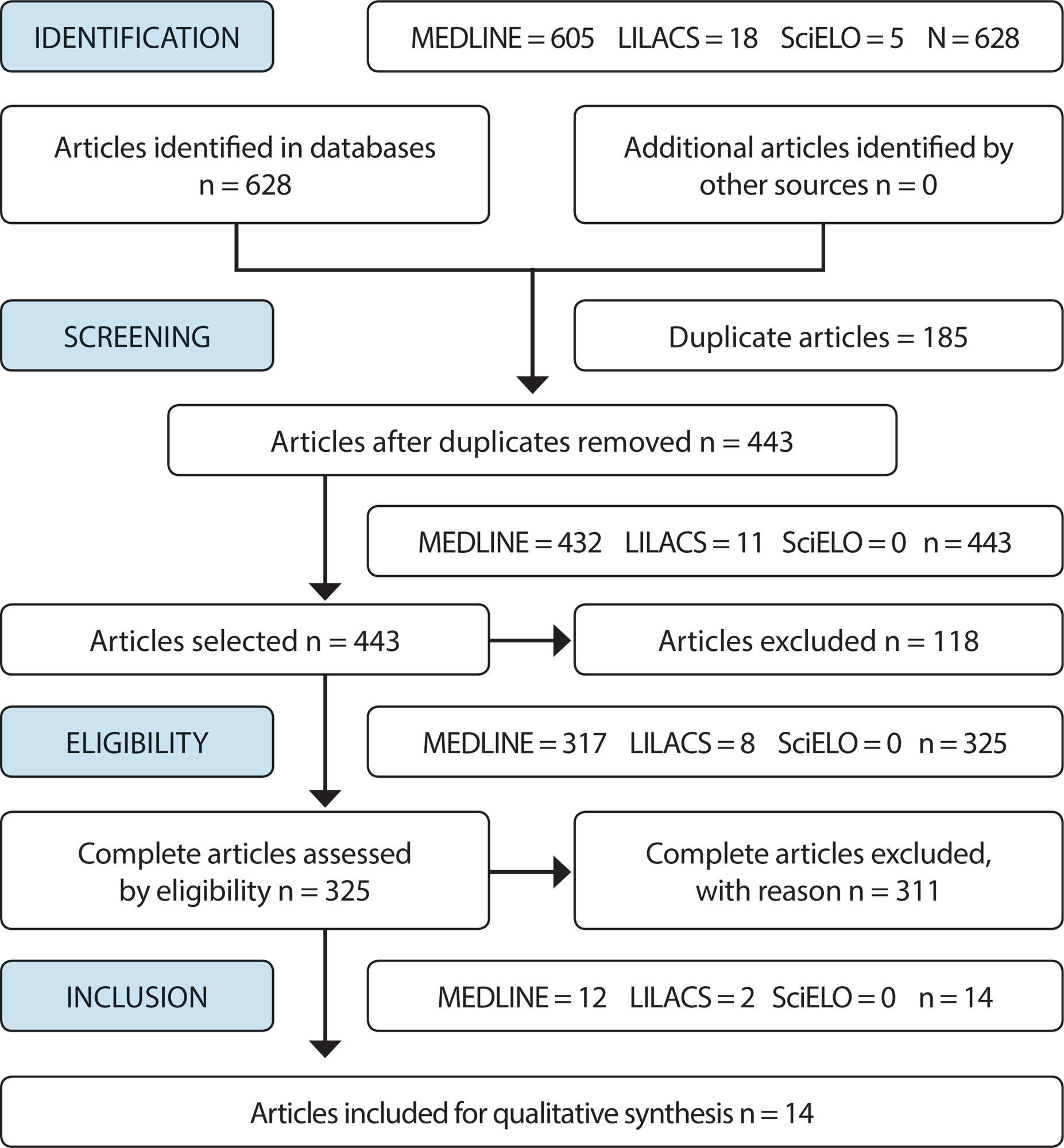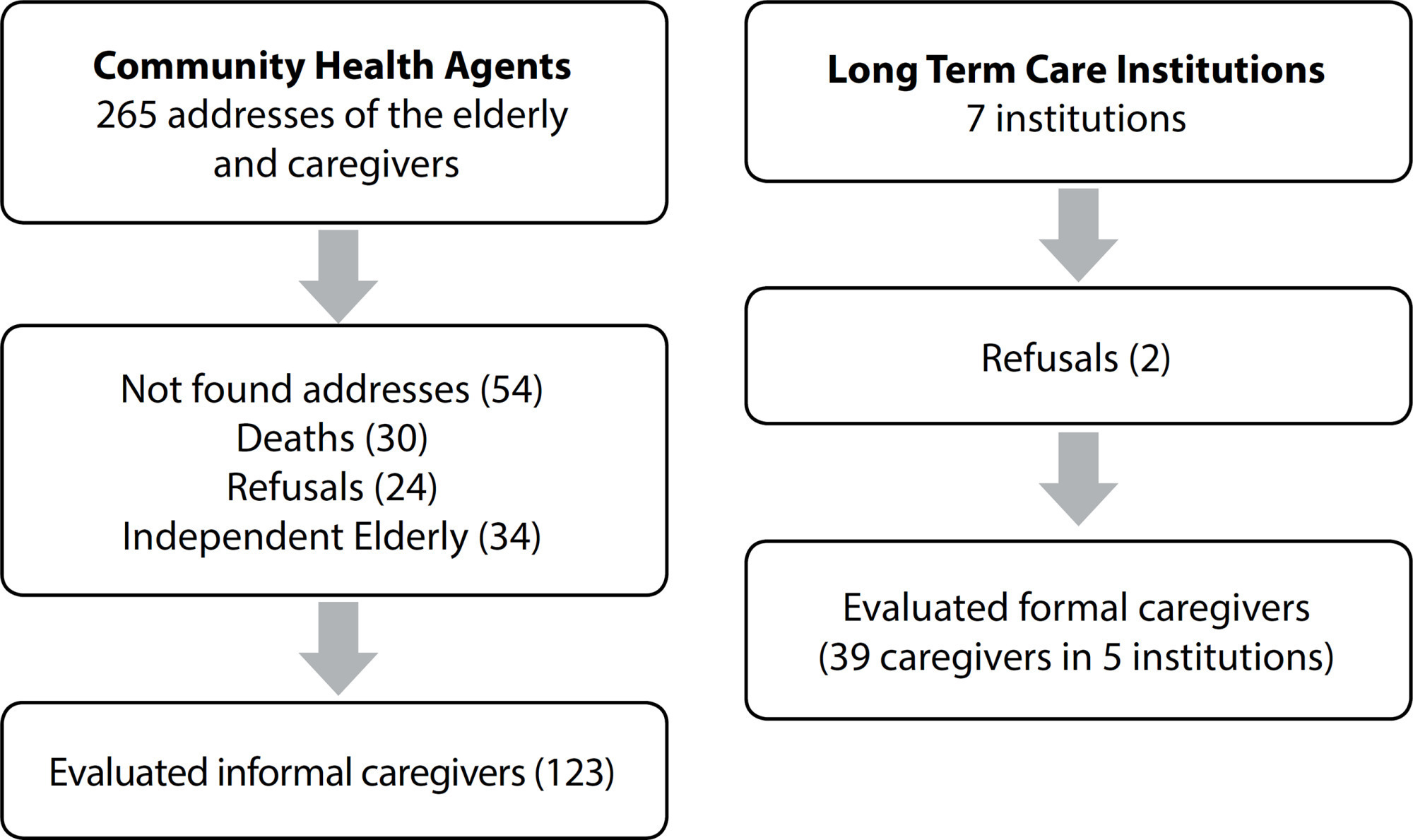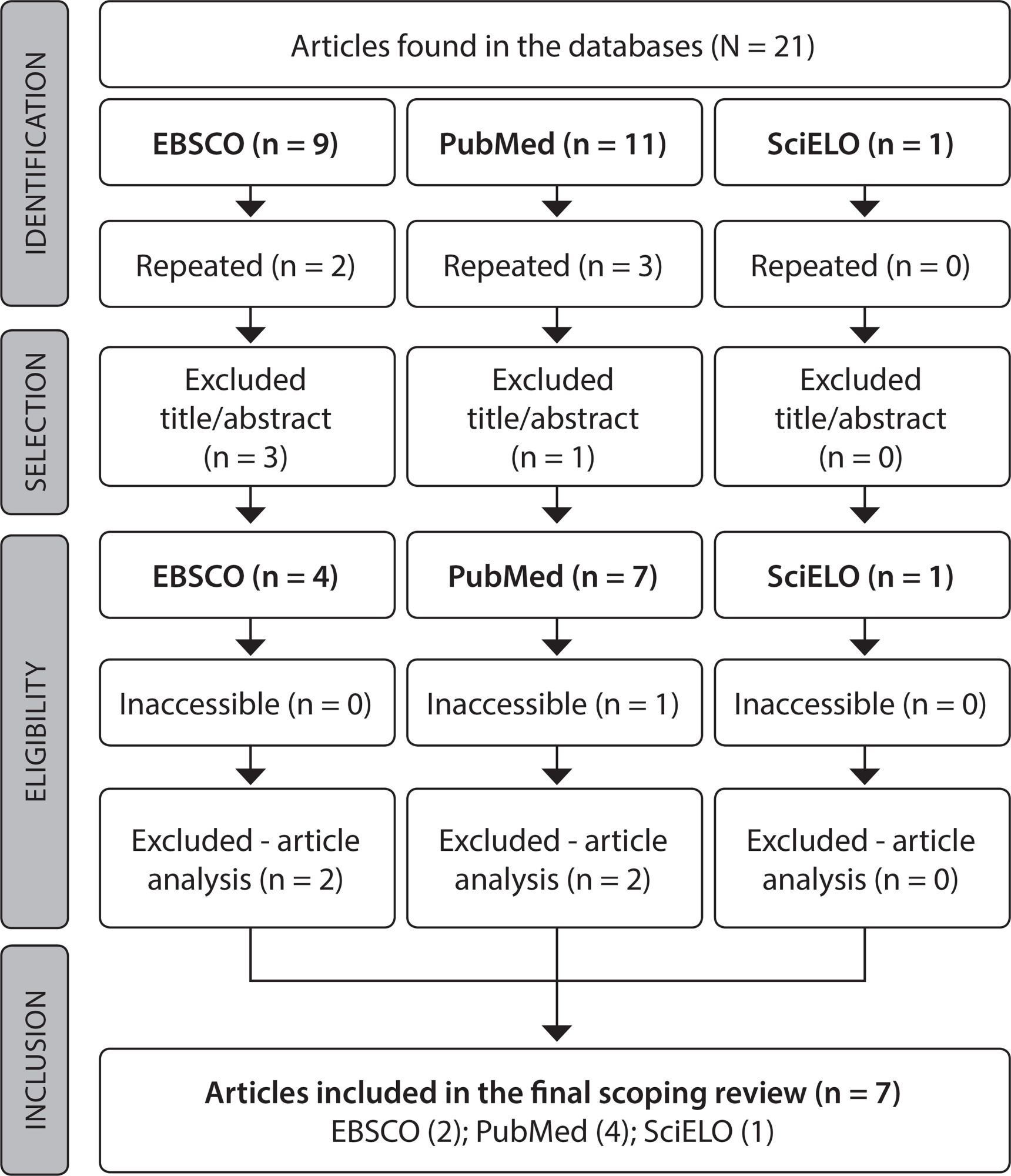-
ORIGINAL ARTICLE10-09-2023
Independent and combined effects of lifestyle behaviors on adolescent health-related quality of life
Revista Brasileira de Enfermagem. 2023;76(4):e20220780
Abstract
ORIGINAL ARTICLEIndependent and combined effects of lifestyle behaviors on adolescent health-related quality of life
Revista Brasileira de Enfermagem. 2023;76(4):e20220780
DOI 10.1590/0034-7167-2022-0780
Views0See moreABSTRACT
Objective:
To investigate the independent and combined effects of lifestyle behaviors, including physical activity, sedentary behavior, sleep duration and food intake, in the health-related quality of life (HRQoL) of Brazilian adolescents.
Methods:
Cross-sectional school-based study, with the participation of 306 adolescents aged 14 to 18 years. A questionnaire was applied with structured questions to collect lifestyle behaviors data. Perception of the HRQoL was identified using the Kidscreen-27. The study used covariance analysis and linear regression models for statistical analysis.
Results:
Adolescents who reported ≤ 2 hours/day of screen-based sedentary behavior and sleep duration equivalent to 8-10 hours/night presented significantly higher HRQoL. Adolescents who reported joint adherence ≥ 3 healthy lifestyle behaviors demonstrated approximately two [OR=2.12] to three times [OR=3.04] more chance of presenting higher perceptions of HRQoL.
Conclusion:
Although healthy lifestyle behaviors had a positive independent effect on HRQoL, joint adherence to healthy behaviors enhances the cumulative effect.

-
ORIGINAL ARTICLE10-09-2023
Health care for people with tuberculosis/HIV co-infection from the multidisciplinary team’s perspective
Revista Brasileira de Enfermagem. 2023;76(4):e20220733
Abstract
ORIGINAL ARTICLEHealth care for people with tuberculosis/HIV co-infection from the multidisciplinary team’s perspective
Revista Brasileira de Enfermagem. 2023;76(4):e20220733
DOI 10.1590/0034-7167-2022-0733
Views0See moreABSTRACT
Objective:
to know the multidisciplinary team’s perspective about the health care of people with tuberculosis and human immunodeficiency virus co-infection in relation to treatment.
Methods:
this is a descriptive-exploratory study, with a qualitative approach, carried out in a health care service in São Paulo, from May to June 2019. Semi-structured interviews were conducted with nine professionals from the multidisciplinary team. Data were processed through discourse analysis with the support of webQDA.
Results:
Two empirical categories emerged: Health care interfaces for people with tuberculosis and human immunodeficiency virus co-infection; Barriers and facilitators for health care for people with co-infection.
Final considerations:
the health-disease process in co-infection is mediated by conditions that positively or negatively interfere with treatment compliance. People’s health care goes beyond exclusively clinical assistance and requires the recognition of needs in a broad perspective.

-
ORIGINAL ARTICLE10-09-2023
Translation and validity of the Multidimensional Individual and Interpersonal Resilience Measure
Revista Brasileira de Enfermagem. 2023;76(4):e20220696
Abstract
ORIGINAL ARTICLETranslation and validity of the Multidimensional Individual and Interpersonal Resilience Measure
Revista Brasileira de Enfermagem. 2023;76(4):e20220696
DOI 10.1590/0034-7167-2022-0696
Views0See moreABSTRACT
Objective:
to translate, culturally adapt and validate the Multidimensional Individual and Interpersonal Resilience Measure to Brazilian Portuguese.
Method:
after initial translation, the pre-final version underwent rigorous cultural adaptation procedures. As a result, the final adapted version was submitted to a validity study.
Results:
adaptation procedures provided equivalence between the pre-final and the original versions in semantic, idiomatic, experiential and conceptual terms. A total of 187 older adults were included in the validity study. Exploratory factorial analysis (EFA) generated a model of five factors ((RMSEA = 0.030; TLI = 0.959; X = 151.590 p> 0.05). Final version showed adequate consistency (Cronbach’s α = 0.705) and test-retest reliability (ICC=0.835). No statistically significant correlation was found between resilience and sociodemographic and epidemiological variables assessed in this study.
Conclusion:
EMRII-BR is a valid and reliable instrument for measuring resilience in Brazilian older adults.
-
10-09-2023
Standard Operating Procedure validity on intramuscular vaccine administration in adults: a methodological study
Revista Brasileira de Enfermagem. 2023;76(4):e20220692
Abstract
Standard Operating Procedure validity on intramuscular vaccine administration in adults: a methodological study
Revista Brasileira de Enfermagem. 2023;76(4):e20220692
DOI 10.1590/0034-7167-2022-0692
Views0See moreABSTRACT
Objective:
to validate a Standard Operating Procedure on the intramuscular vaccine administration technique in adults using high frequency vibration associated with cryotherapy.
Methods:
a literature review on intramuscular vaccination practice using a vibration device associated with cryotherapy. Then, a form was created to validate the instrument, detailing the items that were assessed by judges following recommendations in the literature. Judges’ answers were assessed using the Content Validity Index, with items whose index was greater than or equal to 0.80 being validated.
Results:
twenty-five nurses participated in validity, identifying judges’ opinion regarding item relevance, clarity and accuracy. Judges validated the instrument, according to the values that remained between 0.88 and 1.0.
Conclusions:
the instrument developed and validated is a tool capable of guaranteeing safety and standardizing immunization practice in vaccine rooms.
-
ORIGINAL ARTICLE10-09-2023
Clinical supervision strategies, learning, and critical thinking of nursing students
Revista Brasileira de Enfermagem. 2023;76(4):e20220691
Abstract
ORIGINAL ARTICLEClinical supervision strategies, learning, and critical thinking of nursing students
Revista Brasileira de Enfermagem. 2023;76(4):e20220691
DOI 10.1590/0034-7167-2022-0691
Views0See moreABSTRACT
Objective:
To identify the supervisory strategies that Nursing students consider facilitators of the development of critical thinking skills in clinical teaching.
Methods:
This is a qualitative study, within the interpretative paradigm, using the focus group methodology. Eight undergraduate nursing students participated in the study.
Results:
Participants recognized the indispensability of critical thinking for professional responsibility and quality of care and highlighted the importance of using supervisory strategies adapted to their needs, learning objectives, and the context of clinical practice.
Final considerations:
This study highlights the urgent need to establish, within the Nursing curricula, clinical supervision strategies that promote critical thinking and favor the development of skills for good clinical judgment, problem solving, and safe, effective, and ethical decision-making.
-
EXPERIENCE REPORT10-09-2023
Focus group in the development of concepts for a Nursing model: experience report
Revista Brasileira de Enfermagem. 2023;76(4):e20220689
Abstract
EXPERIENCE REPORTFocus group in the development of concepts for a Nursing model: experience report
Revista Brasileira de Enfermagem. 2023;76(4):e20220689
DOI 10.1590/0034-7167-2022-0689
Views0See moreABSTRACT
Objective:
To communicate the experience of developing concepts for the construction of a care model through focus groups.
Methods:
An experience report on the development of concepts through remote focus groups with members of a research group from a public university in southern Brazil.
Results:
Focus groups were developed in which homogeneity and heterogeneity criteria were observed among participants. In addition to the concepts of the nursing metaparadigm, the concepts of care and family-centered care were developed, relevant to the nursing care model in question.
Final considerations:
Despite the challenges of conducting remote focus groups, they were suitable for the collective construction of concepts for a nursing care model, allowing the interaction of participants from different locations.
-
10-09-2023
Autocompaixão entre estudantes de enfermagem de uma Universidade Estadual da Indonésia durante a pandemia de COVID-19
Revista Brasileira de Enfermagem. 2023;76(4):e20220585
Abstract
Autocompaixão entre estudantes de enfermagem de uma Universidade Estadual da Indonésia durante a pandemia de COVID-19
Revista Brasileira de Enfermagem. 2023;76(4):e20220585
DOI 10.1590/0034-7167-2022-0585
Views0See moreRESUMEN
Objetivo:
Determinar el nivel de autocompasión e investigar las relaciones entre las variables sociodemográficas y la autocompasión entre estudiantes de pregrado de enfermería en una universidad estatal de Indonesia durante la pandemia de COVID-19
Métodos:
Este estudio utilizó un diseño transversal. Las muestras se seleccionaron mediante una técnica de muestreo aleatorio estratificado proporcional (n=260). Los datos se recopilaron utilizando una versión indonesia de la Escala de Autocompasión, que consta de 6 subescalas: bondad propia, autocrítica, humanidad común, aislamiento, atención plena y sobre identificación. Los datos se analizaron mediante análisis univariado y bivariado.
Resultados:
El 60% de los estudiantes tenían autocompasión moderada. Los estudiantes puntuaron más alto en amabilidad consigo mismos (3,93±1,02) y sobre identificación (3,58±0,94), lo que indica que a menudo intentaban amarse a sí mismos cuando sentían dolor emocional y a menudo se dejaban llevar cuando sucedió algo perturbador. Posteriormente, se encontró una correlación significativa entre la edad y la autocompasión (p<0,05).
Conclusión:
La autocompasión entre los estudiantes de enfermería debe mejorarse por medio de intervenciones como la alfabetización de la compasión, el entrenamiento en atención plena y las técnicas experienciales basadas en la compasión.
-
10-09-2023
Tradução e validação do Multidimensional Individual and Interpersonal Resilience Measure
Revista Brasileira de Enfermagem. 2023;76(4):e20220696
Abstract
Tradução e validação do Multidimensional Individual and Interpersonal Resilience Measure
Revista Brasileira de Enfermagem. 2023;76(4):e20220696
DOI 10.1590/0034-7167-2022-0696
Views0See moreRESUMEN
Objetivo:
traducir, adaptar culturalmente y validar el Multidimensional Individual and Interpersonal Resilience Measure para el portugués brasileño.
Método:
después de la traducción inicial, la versión pre-final pasó por rigurosos procedimientos de adaptación cultural. Como resultado, la versión final adaptada fue sometida a un estudio de validez.
Resultados:
los procedimientos de adaptación proporcionaron equivalencia entre las versiones pre-final y original en términos semánticos, idiomáticos, experienciales y conceptuales. Un total de 187 ancianos fueron incluidos en el estudio de validez. El análisis factorial exploratorio (AFE) generó un modelo de cinco factores ((RMSEA = 0,030; TLI = 0,959; X = 151,590 p> 0,05). La versión final mostró adecuada consistencia (α de Cronbach = 0,705) y confiabilidad prueba-reprueba (ICC=0,835). No se encontró correlación estadísticamente significativa entre la resiliencia y las variables sociodemográficas y epidemiológicas evaluadas en este estudio.
Conclusión:
EMRII-BR es un instrumento válido y confiable para medir la resiliencia en ancianos brasileños.
-
REVIEW10-28-2020
Health care of sexual and gender minorities: an integrative literature review
Revista Brasileira de Enfermagem. 2020;73:e20190192
Abstract
REVIEWHealth care of sexual and gender minorities: an integrative literature review
Revista Brasileira de Enfermagem. 2020;73:e20190192
DOI 10.1590/0034-7167-2019-0192
Views0See moreABSTRACT
Objectives:
to describe health care practices aimed at lesbians, gays, bisexuals, transvestites, and transsexuals.
Methods:
an integrative literature review based on systematic steps, in MEDLINE, LILACS AND SciELO databases and/or electronic libraries. It was held from September to November 2018, with articles published between 2012 and 2017, available in full in Portuguese, English, and Spanish, addressing health care to that population group.
Results:
fourteen articles were included. Most of the articles were about the trajectory of individuals within health services and showed limitations and obstacles in the use of these services.
Final Considerations:
there is evidence that factors related to organization of services, attitude of professionals, stigma, and discrimination experienced undermine health care practices. Therefore, it is essential to carry out educational activities in health services and educational institutions.

-
ORIGINAL ARTICLE07-06-2020
Nurses’ work process in an emergency hospital service
Revista Brasileira de Enfermagem. 2020;73(5):e20180923
Abstract
ORIGINAL ARTICLENurses’ work process in an emergency hospital service
Revista Brasileira de Enfermagem. 2020;73(5):e20180923
DOI 10.1590/0034-7167-2018-0923
Views1See moreABSTRACT
Objectives:
to analyze the nurses’ work process in an Emergency Hospital Service.
Methods:
a qualitative, exploratory and descriptive research conducted with 17 nurses from the emergency service of a high complexity hospital in southern Brazil. Data were collected through interviews, focus group and document analysis. Data analysis followed the thematic content analysis framework.
Results:
four categories emerged: Work environment characteristics; Assistance dimension; Management dimension; Care management.
Final Considerations:
the nurses’ work process in Emergency Hospital Service is characterized by the peculiarities of the setting, with centrality in care and care management aiming at quality care and safety to patients.
-
EXPERIENCE REPORT09-29-2022
Mobile pre-hospital care reorganization during the COVID-19 pandemic: experience report
Revista Brasileira de Enfermagem. 2022;75:e20200826
Abstract
EXPERIENCE REPORTMobile pre-hospital care reorganization during the COVID-19 pandemic: experience report
Revista Brasileira de Enfermagem. 2022;75:e20200826
DOI 10.1590/0034-7167-2020-0826
Views0See moreABSTRACT
Objective:
To describe the reorganization of Belo Horizonte’s Mobile Emergency Care Service during the new coronavirus pandemic using the Plan Do-Check-Act quality tool.
Methods:
Descriptive study, of the experience report type, on the reorganization of care in a mobile pre-hospital care service during the new coronavirus pandemic, from March to July 2020. The Plan-Do-Check-Act quality tool was applied for the process.
Results:
Preparation of care protocol, meetings, training, addition of ambulances, hiring of professionals, and other actions were carried out, with subsequent evaluation and monitoring. When failures or new needs were identified, actions and changes were implemented while keeping monitoring and evaluation during the work routine.
Final considerations:
The reorganization of the service through the construction of a protocol and using the Plan-Do-Check-Act as a management tool was essential to promote safe care for professionals and patients.

-
ORIGINAL ARTICLE09-21-2020
Adolescents in situations of poverty: resilience and vulnerabilities to sexually transmitted infections
Revista Brasileira de Enfermagem. 2020;73:e20190242
Abstract
ORIGINAL ARTICLEAdolescents in situations of poverty: resilience and vulnerabilities to sexually transmitted infections
Revista Brasileira de Enfermagem. 2020;73:e20190242
DOI 10.1590/0034-7167-2019-0242
Views0See moreABSTRACT
Objective:
To analyze the association between vulnerabilities to Sexually Transmitted Infections (STIs/HIV/AIDS) of adolescents in poverty and their level of resilience.
Method:
Cross-sectional study with 287 students between 11 and 17 years old in a school in the outskirts of Fortaleza-Ce. The study was conducted from August to October 2016. Three instruments related to characterization, vulnerability to STIs/HIV/AIDS and resilience were used. The association between the instruments was calculated using the Mann-Whitney and Kruskal-Wallis tests. Association between vulnerability to STIs/HIV/AIDS and resilience was assessed through the Spearman’s correlation coefficient. Statistical significance was set at p<0.05.
Results:
There was a significant association between the factors “housing” (p=0.022), “family income” (p=0.037) and vulnerability to STIs/HIV/AIDS. Adolescents whose father has completed high school (p=0.043) have moderately high resilience.
Conclusion:
Adolescents with low socioeconomic status and who live on less than a minimum wage tends to be more susceptible to vulnerabilities to STIs/HIV/AIDS and to have low resilience.
-
ORIGINAL ARTICLE06-14-2021
Mothers’ knowledge of premature newborn care and application of Kangaroo Mother Care at home
Revista Brasileira de Enfermagem. 2021;74(6):e20200717
Abstract
ORIGINAL ARTICLEMothers’ knowledge of premature newborn care and application of Kangaroo Mother Care at home
Revista Brasileira de Enfermagem. 2021;74(6):e20200717
DOI 10.1590/0034-7167-2020-0717
Views0See moreABSTRACT
Objective:
to identify mothers’ knowledge about premature newborn care and application of Kangaroo Mother Care at home.
Methods:
a descriptive, qualitative study carried out with 15 mothers of premature newborns in a reference Maternal and Child Hospital in northern Brazil using two semi-structured interviews with open- and closed-ended questions. The testimonies were analyzed using thematic analysis technique, proposed by Bardin.
Results:
two thematic categories originated: “Caring for a premature newborn at home: strengths and weaknesses” and “Applying Kangaroo Mother Care at home: new knowledge acquired during hospitalization”.
Final considerations:
the speeches of the interviewed mothers pointed out their knowledge about home care of premature NBs and understanding the importance of Kangaroo Mother Care, mainly acquired and improved with the guidance of professionals during hospitalization and application of the method, in addition to fears, possible difficulties in home care and the need to be better informed at hospital discharge.
-
ORIGINAL ARTICLE10-01-2022
Musculoskeletal symptoms in formal and informal caregivers of elderly people
Revista Brasileira de Enfermagem. 2022;75(2):e20210249
Abstract
ORIGINAL ARTICLEMusculoskeletal symptoms in formal and informal caregivers of elderly people
Revista Brasileira de Enfermagem. 2022;75(2):e20210249
DOI 10.1590/0034-7167-2021-0249
Views0See moreABSTRACT
Objective:
to evaluate musculoskeletal symptoms in formal and informal caregivers of elderly people, and check association with personal and work-related factors.
Methods:
this is a cross-sectional study. Instruments for assessment were the International Physical Activity Questionnaire, Self-Reporting Questionnaire-20, Borg’s effort perception scale and Nordic Musculoskeletal Questionnaire.
Results:
informal caregivers had been working for a longer time (60.2% vs. 41%), had more hours of work (37.4% >12h for day), less time off (85.4% vs. 2.5%) and lack of care guidelines (90.2%). The region with the most musculoskeletal symptoms was the spine and the greater dependence of the elderly, the greater the chances of developing musculoskeletal symptoms (OR= 1.3, 95% CI= 1.1-1.6, p <0.05).
Conclusion:
personal and work-related factors were more prevalent in informal group and the elderly person’s dependence interferes with the increase in musculoskeletal symptoms of caregivers.

-
REVIEW11-25-2020
Nurse’s interventions in preventing falls in hospitalized children: scoping review
Revista Brasileira de Enfermagem. 2020;73:e20190409
Abstract
REVIEWNurse’s interventions in preventing falls in hospitalized children: scoping review
Revista Brasileira de Enfermagem. 2020;73:e20190409
DOI 10.1590/0034-7167-2019-0409
Views1See moreABSTRACT
Objectives:
map both nursing interventions for the prevention of falls in paediatric age during hospitalization and the instruments for assessing the risk of falls in paediatrics.
Methods:
scoping review according to the protocol of Joanna Briggs Institute, with acronym PCC (P – children, C – fall preventive nursing interventions and instruments for assessing the risk of falling, C – hospital admission), in three sources of information (EBSCO, PubMed and SciELO).
Results:
the sample consisted of seven articles. The education of the child/family is the basis of the interventions, and the instruments for assessing the risk of falling identified were: Humpty Dumpty Falls Scale, GRAF PIF, CUMMINGS, I’M SAFE and CHAMPS.
Conclusions:
the education of children/parents on preventive measures is important and should be reinforced during hospitalization, using different methodologies. The Humpty Dumpty Falls Scale was the most analyzed.

-
ORIGINAL ARTICLE07-10-2020
Formation of protagonist adolescents to prevent bullying in school contexts
Revista Brasileira de Enfermagem. 2020;73:e20190418
Abstract
ORIGINAL ARTICLEFormation of protagonist adolescents to prevent bullying in school contexts
Revista Brasileira de Enfermagem. 2020;73:e20190418
DOI 10.1590/0034-7167-2019-0418
Views0See moreABSTRACT
Objective:
to develop a participative strategy of health education in the formative process of protagonist adolescents aimed at preventing school bullying.
Method:
qualitative interventive-participatory research, based on the Community-Based Participatory Research and in the Culture Circles of Paulo Freire. The sample was intentional, with the participation of 12 adolescents who were considered leaders. For data production at the moment of educational intervention, observation techniques were employed with note-taking in a field diary, plus photographic and video records.
Results:
the pedagogical intervention model raised the opportunity for the adolescents’ active participation, aiming at the development of skills that create pro-social behaviors, empathetic and assertive relations, which are able to face bullying and transform the school environment.
Final considerations:
the use of participative methodologies, in the youth protagonism perspective, has the potential to support educational practices of school nurses in collaboration and leadership of antibullying programs.

Search
Search in:
Nuvem de Tags
Adolescente (85) Atenção Primária à Saúde (239) COVID-19 (91) Criança (91) Cuidados de Enfermagem (269) Educação em Enfermagem (151) Educação em Saúde (139) Enfermagem (930) Enfermagem Pediátrica (86) Estudantes de Enfermagem (77) Estudos de Validação (131) Família (87) Idoso (208) Promoção da Saúde (99) Qualidade de Vida (104) Saúde do Trabalhador (86) Saúde Mental (145) Saúde Pública (82) Segurança do Paciente (150) Tecnologia Educacional (100)



